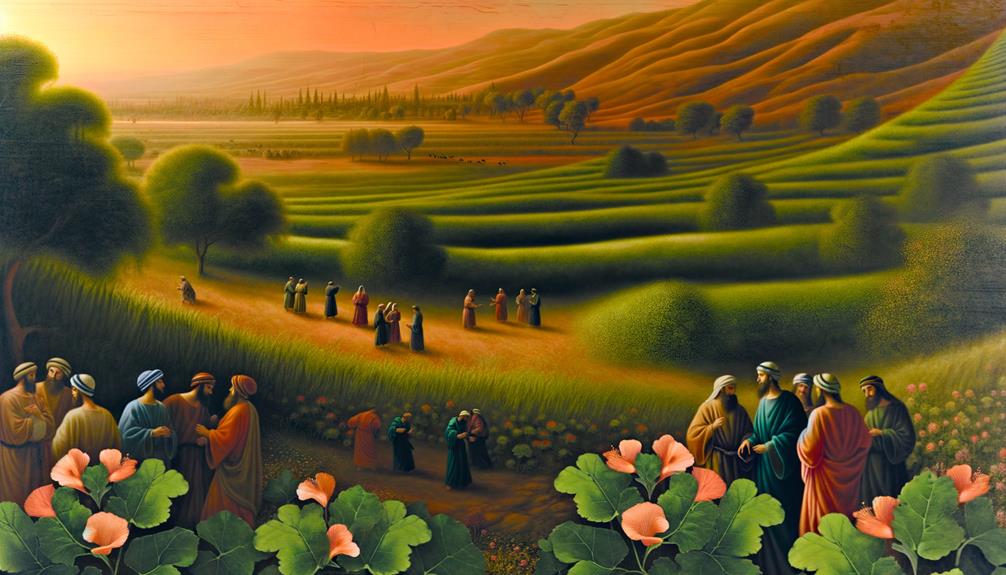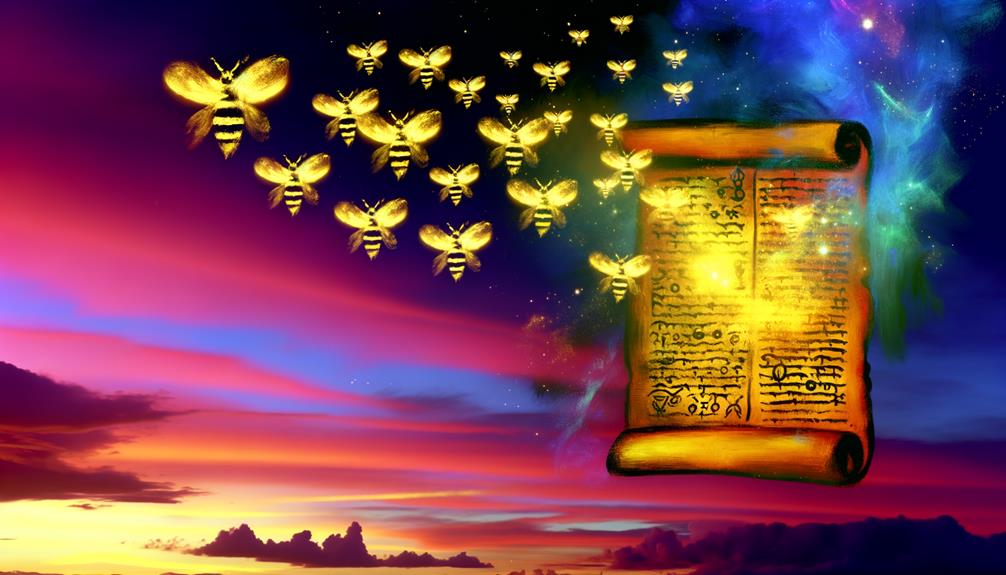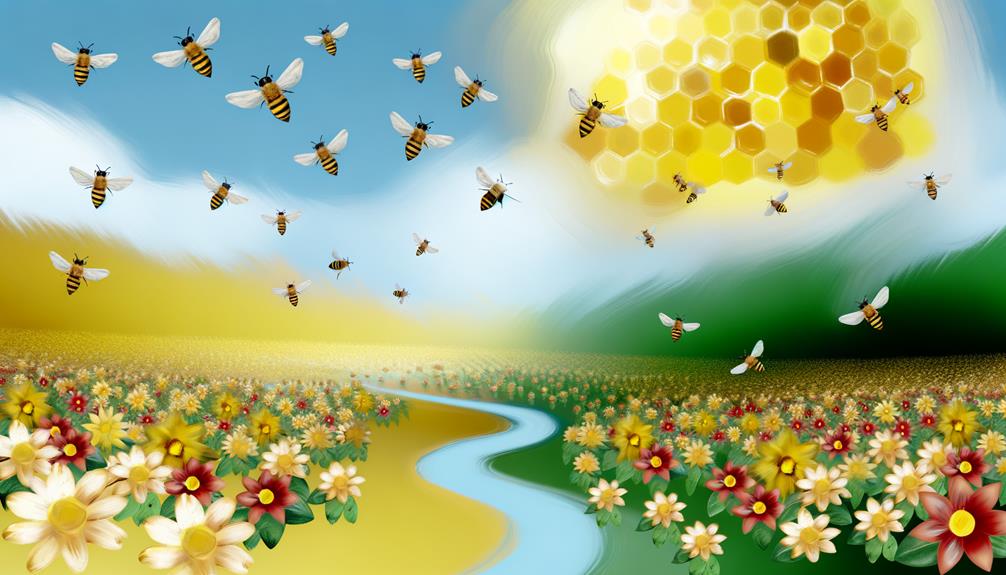Swarm of Bees Meaning in the Bible: Symbolism and Judgment
In the Bible, swarming bees symbolize various theological themes and divine actions. They illustrate divine retribution and protection, as seen in Deuteronomy, where swarms represent God’s judgment and the consequences of disobedience.
Conversely, bees signify sustenance and transformation in the story of Samson, where honey represents life emerging from death. The industrious nature of bees serves as a metaphor for diligence and communal cooperation, underscoring virtues valued by God.
This imagery extends to prophetic visions of judgment, cementing bees’ significance in depicting both divine blessings and warnings. Exploring these layers reveals the depth of biblical teachings on justice and mercy.

Swarm of Bees Meaning in the Bible: Symbolism and Spiritual Lessons
| Biblical Reference | Meaning | Symbolism | Spiritual Insight |
|---|---|---|---|
| Deuteronomy 1:44 | Divine Judgment | Bees attacking as punishment | Represents God’s wrath and discipline |
| Judges 14:8-9 | Unexpected Blessing | Honey from lion’s carcass | God provides sweetness in unlikely places |
| Psalm 118:12 | Overwhelming Opposition | Bees surrounding the psalmist | Enemies may swarm, but God brings victory |
| Isaiah 7:18 | Divine Summoning | Bees as instruments of God | God uses nature for His purposes |
| General Interpretation | Industry and Productivity | Bees as diligent workers | Encourages hard work and community service |
Samson and the Lion’s Carcass

In the biblical narrative found in Judges 14, the story of Samson and the lion’s carcass serves as a pivotal moment that intertwines divine intervention with symbolic elements, particularly the swarm of bees and the honey within the carcass.
This event is notable for its theological implications: it highlights the motif of transformation and the unexpected presence of life (bees and honey) emerging from death (the lion’s carcass).
Historically, the account underscores the Nazirite vow, which Samson violates by touching the dead body, yet divine providence still operates through this transgression.
Analytically, the bees and honey symbolize sustenance and sweetness derived from a source of decay, reflecting the paradoxical nature of Samson’s judgeship and the divine mystery in Israel’s deliverance.
Bees in Deuteronomy

In Deuteronomy, bees are invoked as instruments of divine retribution, symbolizing the Lord’s power to both punish and protect.
The text uses the imagery of a relentless swarm to convey the severity of God’s warnings against disobedience and the consequences that follow.
This vivid portrayal underscores the theological theme of divine justice and the protection afforded to those who adhere to the covenant.
Symbolic Warnings and Punishments
Deuteronomy 1:44 vividly depicts bees as instruments of divine retribution, symbolizing the consequences of disobedience to God’s commandments. In this passage, the Israelites are chased by Amorites, likened to a swarm of bees, illustrating the chaos and relentless nature of divine punishment.
This imagery serves to underscore several key aspects:
- Inescapable Pursuit: Just as bees relentlessly pursue their target, divine punishment is unavoidable.
- Collective Action: A swarm operates in unison, highlighting the collective consequences of communal disobedience.
- Stinging Pain: Each bee’s sting symbolizes the acute suffering caused by ignoring divine laws.
- Relentless Agitation: The agitation of a bee swarm reflects the turmoil inflicted on those who stray from God’s path.
Thus, the biblical use of bees encapsulates profound theological warnings.
Divine Retribution and Protection
Within the broader narrative of Deuteronomy, the depiction of bees as agents of divine retribution serves to highlight the dual themes of judgment and protection inherent in the covenantal relationship between God and the Israelites. In Deuteronomy 1:44, bees symbolize divine wrath, swarming upon those who defy God’s commandments, illustrating the severe consequences of disobedience. Conversely, the absence of such calamities for the obedient underscores divine protection and favor.
| Aspect | Divine Retribution | Divine Protection |
|---|---|---|
| Scriptural Basis | Deuteronomy 1:44 | Deuteronomy 28:1-14 |
| Symbolism | Bees as agents of punishment | Absence of bees signifies peace |
| Theological Implication | Consequences of disobedience | Rewards for adherence |
This duality reinforces the covenant’s reciprocal nature, where divine justice and mercy coexist.
Symbol of Diligence

In biblical literature, bees often serve as a potent symbol of diligence, exemplified through their unwavering work ethic and meticulous community organization.
The industrious nature of bees is frequently invoked to illustrate the virtues of hard work and cooperation among individuals, reflecting a theological ideal of collective effort and harmony.
Historically, these attributes have been recognized as essential to societal cohesion and prosperity, reinforcing the bees’ emblematic status in scriptural references.
Exemplary Hard Work
The industrious nature of bees in the Bible is often highlighted as a symbol of diligence and hard work, serving as an exemplar for human conduct in various scriptural passages. This portrayal underscores the theological virtues of labor and perseverance.
Historically, bees have been depicted in biblical texts to emphasize:
- Persistent Effort: Proverbs 6:6-8 advises observing the ant, akin to bees, for its relentless work.
- Productivity: The production of honey symbolizes fruitful outcomes from diligent labor.
- Orderliness: Bees’ structured lives mirror the divine order intended for humanity.
- Steadfastness: The unwavering commitment of bees is paralleled to spiritual steadfastness.
Through these illustrative points, the Bible presents the bee as a timeless emblem of industriousness, encouraging believers to emulate such attributes in their own lives.
Community and Cooperation
Drawing from the industrious nature of bees, Scripture also accentuates their remarkable sense of community and cooperation as a further demonstration of their diligence.
Historically and theologically, bees are often depicted as models of harmonious social structure, reflecting an ideal of communal living. Proverbs 6:6-8 extols the ant’s labor, implicitly inviting comparisons with the bee’s equally commendable work ethic.
This collective effort symbolizes the unity and shared purpose that should characterize human endeavors, especially within the body of believers. By observing bees, biblical texts highlight the virtues of mutual assistance, coordinated effort, and selflessness, underscoring the importance of working together toward a common goal.
Such ideals are not merely agricultural but are woven deeply into the spiritual and communal fabric of biblical teaching.
Prophetic Visions

Prophetic visions in the Bible frequently employ vivid and symbolic imagery, and the swarm of bees is no exception, serving as a potent metaphor within various scriptural contexts.
Historically, bees in prophetic visions have conveyed messages of:
- Judgment and Retribution: Symbolizing the relentless and overwhelming nature of divine punishment, as seen in Isaiah 7:18.
- Chaos and Disorder: Representing the disarray and confusion that befall nations under God’s judgment.
- Divine Omnipotence: Illustrating God’s sovereign control over nature and His capacity to summon even the smallest creatures for His purposes.
- Community and Cooperation: Reflecting the intricate, organized societies of bees, which can parallel human communities under divine order.
These symbolic uses underscore the multifaceted dimensions of biblical prophecy, enhancing theological understanding.
Bees in Psalm 118

In Psalm 118, the swarm of bees serves as a vivid metaphor for the fierce and numerous adversaries surrounding the psalmist, emphasizing the intensity of the struggle and the ultimate triumph through divine intervention.
This imagery, rooted in ancient Near Eastern culture, conveys the overwhelming and relentless nature of opposition. Historically, bees were both feared and revered for their collective power and painful sting.
Theologically, the psalmist’s victory, despite such intimidating challenges, underscores the steadfastness of God’s protection and deliverance.
The metaphor encapsulates the broader biblical theme of God’s sovereignty over human conflicts, illustrating that faith in divine support can transform seemingly insurmountable threats into moments of profound deliverance and spiritual victory.
Community and Cooperation

The biblical portrayal of bees often underscores the values of community and cooperation, reflecting ancient societal ideals and theological principles.
The meticulous structure of a beehive serves as an emblem of collective effort and harmony, a microcosm of divinely-ordained order.
This symbolism is articulated through various biblical references, where bees exemplify:
- Unity: The unified work of bees illustrates the power of communal effort.
- Diligence: Bees’ tireless labor is a metaphor for human industriousness.
- Interdependence: The symbiotic relationships within a hive mirror the interconnectedness of human communities.
- Productivity: Bees producing honey serve as a parable for the fruits of cooperative endeavors.
Thus, bees in Scripture subtly advocate for a cohesive, well-ordered society bound by mutual support and shared purpose.
Divine Judgment

While the biblical depiction of bees often celebrates community and cooperation, it also employs the image of a swarm to signify divine judgment and overwhelming consequence.
In Deuteronomy 1:44, the Israelites’ disobedience leads to their defeat by Amorites, described as being ‘chased as bees do.’ This imagery evokes a relentless and inescapable force, portraying divine retribution.
Similarly, Isaiah 7:18 uses the metaphor of bees to symbolize God’s summoning of Assyrians as an instrument of judgment.
Historically and theologically, a swarm of bees underscores the severity of divine displeasure, manifesting as an unstoppable, punitive force.
This duality in symbolism—both communal and judgmental—reflects the multifaceted nature of biblical metaphors and their theological implications.
Promised Land Imagery

Reflecting a vision of abundance and divine provision, the biblical imagery of the Promised Land frequently incorporates references to bees and honey. This symbolism underscores the richness and fertility of the land promised to the Israelites.
The recurrent theme serves several purposes:
- Abundance: Flowing with ‘milk and honey’ (Exodus 3:8), indicating plenty.
- Divine Blessing: Bees producing honey symbolize God’s providence.
- Fertility: The presence of bees suggests a thriving, productive environment.
- Sustenance: Honey represents sustenance and sweetness, enhancing life.
This imagery not only paints a picture of a bountiful land but also reinforces the covenantal promise made by God to His people, highlighting His role as the ultimate provider.
Lessons From Nature

Bees in the biblical narrative offer profound lessons from nature, illustrating divine wisdom and the harmonious order of creation.
In Scriptures such as Deuteronomy 1:44 and Judges 14:8, bees symbolize industriousness, cooperation, and the intricate balance inherent in God’s design. Their communal behavior reflects the biblical call for unity and purposeful labor among God’s people.
Historically, the Israelites’ observation of bees underscored the importance of diligence and organization, mirroring the structured life ordained by divine commandments.
The swarm, while often viewed as a collective force, also serves as a reminder of the potential consequences of disobedience and chaos.
Therefore, bees encapsulate a dual lesson: the blessings of living in harmony with divine principles and the perils of straying from them.
Conclusion
In biblical texts, bees serve as multifaceted symbols: representing divine judgment, illustrating community and cooperation, embodying diligence, and appearing in prophetic visions.
Their presence in narratives such as Samson and the Lion’s Carcass, as well as in Deuteronomy and Psalm 118, highlights their significance.
Bees underscore lessons from nature, embody Promised Land imagery, and offer profound theological insights.
Through these scriptural references, bees provide a rich tapestry of spiritual and moral teachings that resonate throughout biblical literature.






